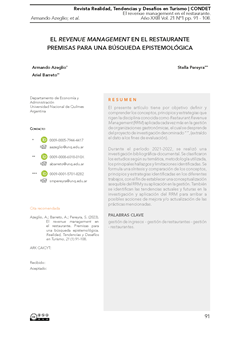El revenue management en el restaurante. Premisas para una búsqueda epistemológica.
Contenido principal del artículo
Resumen
El presente artículo tiene por objetivo definir y comprender los conceptos, principios y estrategias que rigen la disciplina conocida como Restaurant Revenue Management (RRM) aplicada cada vez más en la gestión de organizaciones gastronómicas, el cual se desprende del proyecto de investigación denominado “”, (extraído el dato a los fines de evaluación).
Durante el período 2021-2022, se realizó una investigación bibliográfica-documental. Se clasificaron los estudios según su temática, metodología utilizada, los principales hallazgos y limitaciones identificadas. Se formula una síntesis y comparación de los conceptos, principios y estrategias identificadas en los diferentes trabajos, con el fin de establecer una conceptualización asequible del RRM y su aplicación en la gestión. También se identifican las tendencias actuales y futuras en la investigación y aplicación del RRM para arribar a posibles acciones de mejora y/o actualización de las prácticas mencionadas.
Descargas
Detalles del artículo

Esta obra está bajo una licencia internacional Creative Commons Atribución-NoComercial-CompartirIgual 4.0.
Citas
Cross, T. L.& Jepsen, D. A. (2001). The psychological maltreatment rating scales. In Myers, Berliner, Briere, Hendrix, Jenny & Reid (Eds.), The APSAC handbook on child maltreatment (2nd ed.), 87-104. Sage Publications.
Cross, R. G. (2014). Dynamic pricing in the restaurant industry. Journal of Foodservice Business Research, 17(2), 112-130.
Goh, B. K., & Lee, K. (2019). Short-term demand forecasting for revenue management: A deep learning approach. Journal of Hospitality and Tourism Technology, 10(3), 374-391.
Gómez Gallego, J. C. y MolinaAzorín, J. F. (2019). Revenue management in the restaurant industry: A systematic literature review. International Journal of Hospitality Management, 82, 154-168.
González, M. (2019). Revenue management en restaurantes: una nueva forma de aumentar la rentabilidad. Recuperado de https://www.tsc.com.es/revenue-management-en-restaurantes/
Gregorash, B. J. (2016). Restaurant Revenue Management: apply reservation management? Information Technology & Tourism, 16,331–346.
Gursoy, D., Chi, C. G., & Lu, L. (2017). Antecedents and outcomes of mobile app satisfaction: Moderating effects of perceived value and frequency of use. Journal of Travel Research, 56(7), 838-854.
Heo, C. Y. (2017). New performance indicators for Restaurant Revenue Management: ProPASH and ProPASM, International Journal of Hospitality Management, 61, 1–3.
Kim, S. Y, & Mattila, A. S. (2015). The effects of customer participation in co-created service recovery. Journal of Service Theory and Practice, 25(4), 421-439.
Kim, K., Kim, M. J. y Jun J. K. (2020). Small Queuing Restaurant Sustainable Revenue Management, Sustainability, 12(8), 1–14.
Kim, Y., Kim, M., & Jun, H. (2020). Exploring determinants of restaurant revenue management and its impact on financial performance. International Journal of Hospitality Management, 91, 102656.
Kimes, S. E., Chase, R. B., Choi, S., Lee, P. Y. y Ngonzi, E. N. (1998). Restaurant Revenue Management: Applying Yield Management to the Restaurant Industry. Cornell Hotel and Restaurant Administration Quarterly, 39(3),32–39.
Kimes, S. E., Barrash, D. I., Alexander, J. E. (1999). Developing a Restaurant Revenue-management Strategy. Cornell Hotel and Restaurant Administration Quarterly, 40(5),18–29.
Kimes, S. E., & Wirtz, J. (2003). Has revenue management become acceptable? Findings from an international study on the perceived legitimacy of rate fences. Journal of Service Research, 5(2), 131-143.
Kimes, S. E. (2004). Restaurant Revenue Management: Could it work? Journal of Revenue and Pricing Management, 4(1), 95–97.
Kimes, S. E. (2008). The future of hotel revenue management. Cornell Hospitality Quarterly, 49(3), 283-286.
Kimes, S. E. (2012). The future of restaurant revenue management. Journal of Hospitality & Tourism Research, 36(4), 420-436.
Kimes, S. E., Beard J. (2013). The future of Restaurant Revenue Management, Cornell University School of Hotel Administration, 1–14.
Kimes, S. E. (2013). Leveraging consumer psychology for smarter revenue management. Cornell Hospitality Quarterly, 54(1), 26-33.
Kimes, S. E. (2020). The future of restaurant revenue management. Cornell Hospitality Quarterly, 61(3), 240-252.
Lockyer, L. (2007). A critical review of constructivism and implications for its use in nursing research. Journal of Clinical Nursing, 16(6), 1736-1743. DOI: 10.1111/j.1365-2702.2006.01984.x
Ma, Q., & Koenig-Lewis, N. (2021). The impact of COVID-19 on the tourism industry: Lessons learned from a crisis. Journal of Travel Research, 0047287520966070
Pérez-Correa, J. R., Ramírez, M. V., & Granados, E. L. (2019). Revenue Management practices in Mexican restaurants: An exploratory study. Journal of Hospitality and Tourism Management, 39, 55-63.
Schiaffella, E. (2006). Revenue management and food service businesses: the case of Italy, in Sfodera (Ed.) The Spread of Yield Management Practices, Physica-Verlag HD, 113–119.
Sigala, M. (2018). Addressing the “I” in tourism and hospitality marketing: Personalisation, customisation and co-creation implications. Journal of Tourism and Hospitality Management, 6(1), 1-4.
Thompson, G. M. (2003). Optimizing Restaurant-table Configurations: Specifying Combinable Tables. Cornell Hotel and Restaurant Administration Quarterly, 44(1), 53–60.
Thompson, G. M. (2015). Restaurant Reservation Optimization Tool. Cornel Hospitality Tool, 6(4), 3–10.
Tse, T. S. M., & Poon, Y. T. (2017). Restaurant revenue management: A review of decision-support tools. International Journal of Hospitality Management, 66, 107-120. doi: 10.1016/j.ijhm.2017.06.001
Verbeeten, F. H. J. y Tiemeier, H. (2009). A conceptual and methodological critique of the IQ-complexity relation in creativity research. The Journal of Creative Behavior, 43(1), 1-14.
Wang, Wang, D., & Park, J. (2011). Restaurant revenue management: Application to seat inventory control. International Journal of Hospitality Management, 30(4), 886-896. https://doi.org/10.1016/j.ijhm.2010.12.010
Xie, K. L., Chen, W., & Wu, Y. C. (2016). Dynamic pricing for hotel revenue management using deep learning. Journal of Hospitality and Tourism Research, 40(1), 3-24.
Xu, X., Zhang, J., Fu, X., Huang, W., & Zhang, Z. (2017). Revenue management in restaurants: A comprehensive review. Journal of Hospitality and Tourism Management, 31, 57-70. doi: 10.1016/j.jhtm.2017.02.005
Yang, S. S., Kimes, S. E., & Sessarego, M. M. (2009). $ or dollars: Effects of menu-price formats on restaurant checks. Cornell Hospitality Report, 9(8), 6-11.
Zatta, D. (2007). Revenue management. Come ottimizzare l’uso delle risorse aziendali per massimizzare i profitti, Hoepli, Milano.
Zorn, C., & Cataldo, A. (2013). Restaurant revenue management: Implementation and impact on service quality. International Journal of Hospitality Management, 33, 59-70.
